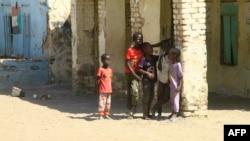Children in conflict zones around the world are being denied life-saving humanitarian aid in a blatant disregard for international law, a senior United Nations official said on Wednesday.
Virginia Gamba, the United Nations special envoy for children and armed conflict, told a meeting: “Let me be clear: the Geneva Conventions and the Convention on the Rights of the Child contain requirements to provide humanitarian relief to children in need. Key Provisions for Facilitation.” Security Council.
“International humanitarian law also prohibits the denial of humanitarian assistance to children and attacks on humanitarian workers assisting children,” she said.
She said her office verified nearly 4,000 such aid denial cases in 2022, with the highest numbers in the occupied Palestinian territories, Yemen, Afghanistan and Mali. Gamba said data from a forthcoming report from her office shows the negative trend continues.
“There are situations involving highly arbitrary barriers and/or outright denials of humanitarian assistance to children, including situations such as the Occupied Palestinian Territory and Haiti,” she said.
Gamba stated that denial of aid access is associated with restrictions on humanitarian activities and operations; interference with humanitarian operations and discrimination against aid recipients; direct and indiscriminate attacks on civilian infrastructure; disinformation; looting; and detention, violence and the killing of humanitarian personnel.
Children are particularly affected by lack of nutrition, education and health care, which can have lifelong consequences. This is even more devastating for children with disabilities, Gamba said. It also affects boys differently than girls.
“For example, restrictions on the movement of girls prevent them from accessing aid in areas where it might be distributed, including in internally displaced persons camps, while teenage boys may be seen as affiliated with the opposition and therefore unable to access aid,” she explain.
Gamba called on all parties to allow and facilitate safe, timely and unhindered humanitarian access, as well as children’s access to services, assistance and protection, and to ensure the safety and security of humanitarian personnel and assets. Hospitals, schools and their staff must also be protected by international humanitarian law, she said.
The deputy executive director of UNICEF urged the Security Council to help humanitarian personnel gain the access they need. Ted Chaiban stressed that the work of aid organizations requires greater exemptions from sanctions resolutions; they need to be able to engage with all armed groups without fear of consequences; and access across borders and conflict lines.
“Around the world, our field teams are working hard to reach children in increasingly difficult operating environments,” Chaiban said, adding that they are committed to staying and delivering services.
“Children are the first to suffer and those who bear the most lasting humanitarian consequences,” he said. “All parties have a legal and moral responsibility to ensure that children have access to humanitarian services.”







